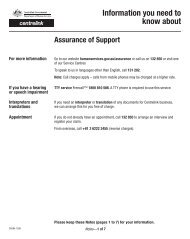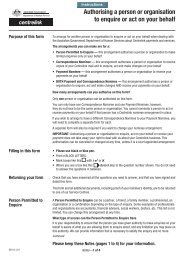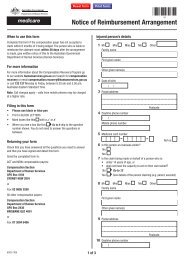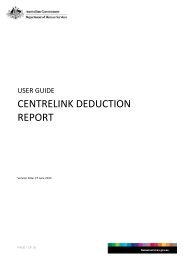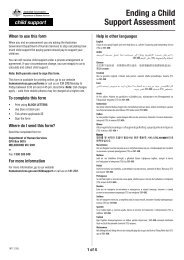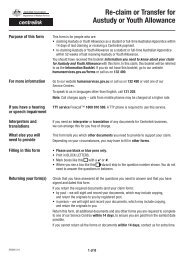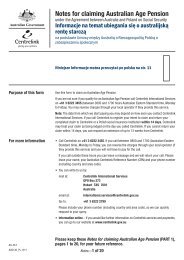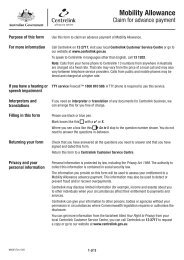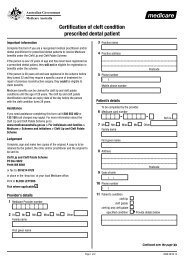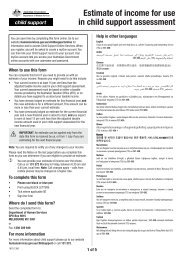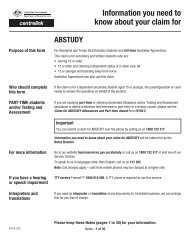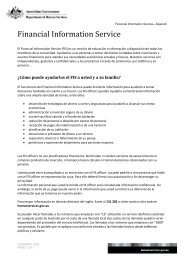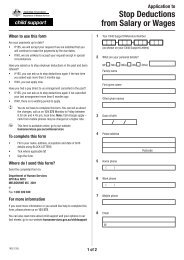Department of Human Services Agreement 2011–2014 [pdf, 1.05mb]
Department of Human Services Agreement 2011–2014 [pdf, 1.05mb]
Department of Human Services Agreement 2011–2014 [pdf, 1.05mb]
You also want an ePaper? Increase the reach of your titles
YUMPU automatically turns print PDFs into web optimized ePapers that Google loves.
PART I<br />
PERFORMANCE MANAGEMENT<br />
I1<br />
PURPOSE OF PERFORMANCE MANAGEMENT<br />
I1.1 The purpose <strong>of</strong> the performance management process is to:<br />
(a)<br />
(b)<br />
(c)<br />
(d)<br />
(e)<br />
(f)<br />
develop a culture <strong>of</strong> high performance in the department;<br />
align individual performance requirements with business requirements;<br />
ensure that employees have a clear understanding <strong>of</strong> their role, and the<br />
performance standards expected <strong>of</strong> them;<br />
support and encourage ongoing feedback between employees and their direct<br />
supervisors, including through formal mechanisms;<br />
identify and plan for learning and development needs; and<br />
assess and reward employee performance.<br />
I2<br />
PRINCIPLES OF PERFORMANCE MANAGEMENT<br />
I2.1 Joint responsibility – employees and supervisors will participate in all aspects <strong>of</strong> the<br />
performance management process, including initiating reviews, and seeking and providing<br />
feedback as required; and be provided with resources and support to do so.<br />
I2.2 Confidentiality – performance management processes, including access to and the use <strong>of</strong><br />
performance data, will comply with privacy principles.<br />
I2.3 No surprises – the performance process will ensure that employees are aware <strong>of</strong> their<br />
performance progress. Supervisors and managers should identify and address performance<br />
concerns at the earliest opportunity.<br />
I2.4 Fair – the performance process will provide employees with an opportunity to, respond to<br />
performance feedback, and will provide reasonable adjustments for employees with disabilities<br />
if required; consistent with natural justice principles.<br />
I2.5 Holistic – business related work outcomes and performance measures will be realistic, within<br />
the employee’s control and consistent with their work level. The performance assessments will<br />
balance qualitative and quantitative evidence <strong>of</strong> employee performance.<br />
I2.6 Representation – an employee may have a support person (who may be a union<br />
representative) at any stage <strong>of</strong> the performance process. All parties in a performance process<br />
will undertake discussions constructively. The support person's role may facilitate and may<br />
supplement direct discussions between the employee and their supervisor.<br />
I3<br />
PERFORMANCE CYCLE<br />
I3.1 The performance cycle for all employees will run from 1 July each year to 30 June in the<br />
following year.<br />
I4<br />
PERFORMANCE PROCESS<br />
I4.1 An employee and their supervisor will develop and agree on an Individual Performance<br />
<strong>Agreement</strong> within eight weeks <strong>of</strong>:<br />
<strong>Department</strong> <strong>of</strong> <strong>Human</strong> <strong>Services</strong> <strong>Agreement</strong> 2011 – 2014 70


![Department of Human Services Agreement 2011–2014 [pdf, 1.05mb]](https://img.yumpu.com/35930902/74/500x640/department-of-human-services-agreement-2011-2014-pdf-105mb.jpg)
